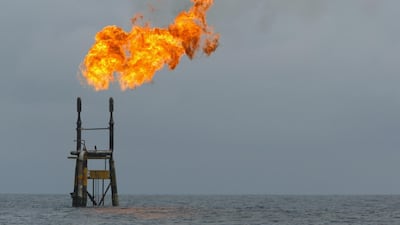Global spending on upstream oil and gas could be slashed by more than 25 per cent as crude prices trend below $30 per barrel following the slowdown in economic activity due to the coronavirus pandemic, according to consultancy Wood Mackenzie.
"Large new projects will be put on hold and short-cycle discretionary investment will be dialled back to the bare minimum," the consultancy said in a report.
"Spend on projects under development and on-stream will also be targeted. Exploration will be trimmed; operating and other fixed costs face intense scrutiny," it added.
As countries around the world enforce lockdown measures to contain the spread of Covid-19, air travel and land transportation have ground to a halt, resulting in decline in demand for crude.
Supply is also set to flood the markets as a production restriction pact between Opec producers and non-members led by Russia dissolved. Gulf producers such as Saudi Arabia and the UAE are expected to bring 12.3 million barrels per day and 4m bpd, respectively, into the markets next month and discount prices to regain market share lost during earlier output curbs.
The potential supply influx has already pressured prices downward, with crude commodity benchmarks Brent and West Texas Intermediate losing 60 per cent of their value from January highs of above $60 per barrel.
Russia not endorsing deeper cuts are widely anticipated to be targeting US independent shale producers who have gained from price stabilisation under Opec+ output restrictions. However, with no deal in place, shale producers are expected to be hit hard.
"Only the lowest-cost producers with the strongest finances will be in a position to make meaningful discretionary investments. Any decision to follow Saudi and Russia and grow output will likely be driven by policy rather than economics," Wood Mackenzie said.
Top producers – the US, Russia and Saudi Arabia – need to continue drilling wells to maintain output levels. Moscow and Riyadh are expected to set production and investment levels, unlike Washington, which does not interfere in shale production.
"In the short term, companies, governments and other stakeholders are likely to continue producing assets at a loss, as they have in the past, in the hope the price will rebound quickly," the consultancy said.
"But, the current trifecta of oversupply, demand evaporation and global behemoths fighting for market share may require immediate and dramatic action," it added.


